Using global shares to break your dividend dependency
Global equities are usually added to a portfolio for one reason – to increase diversification. With the Australian equity market representing only 2-3% of global equity exposure, plus very high sector concentrations in the local market, the benefits of global diversification are particularly meaningful for Australian investors.
However, leaving geographical considerations aside, how much diversification is actually being delivered at a sector and factor level? When income is the main consideration, the global equity sectors that generate the highest dividend yields are typically concentrated in the same sectors that dominate the Australian market. As a direct result, ‘going global’ may unwittingly ‘double down’ on these identical high yield sector exposures, albeit in a different geography, and thus fail to maximise the diversification benefit.
One solution to this problem is to introduce an alternate source of income that does not rely upon dividend yields. Buy-Write strategies are an established and well-proven solution to yield generation that breaks the connection with dividend dependency. Global Buy-Write strategies can offer genuine diversification at both the sector and country level as well as providing a regular income stream and an element of capital stability.
One plus one can sometimes equal one
The lack of breadth and resulting sector concentrations of the Australian market are very evident when comparing Australian equities to the Global universe. The very high exposures to Financials and Materials, and low exposures to Technology and a diversified global Health Care exposure are represented below (Health Care represented with and without CSL).
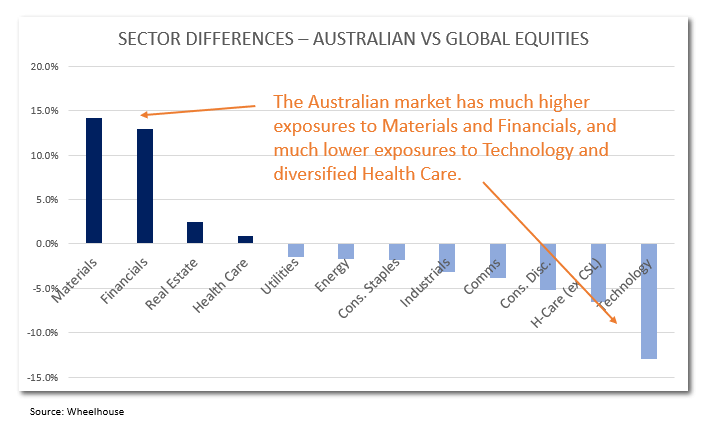
However, as many investors would know, yields on global equities are often less than the local market, especially after franking credits are considered. Respectable yields do exist in global equities, but they tend to be concentrated in a few sectors.
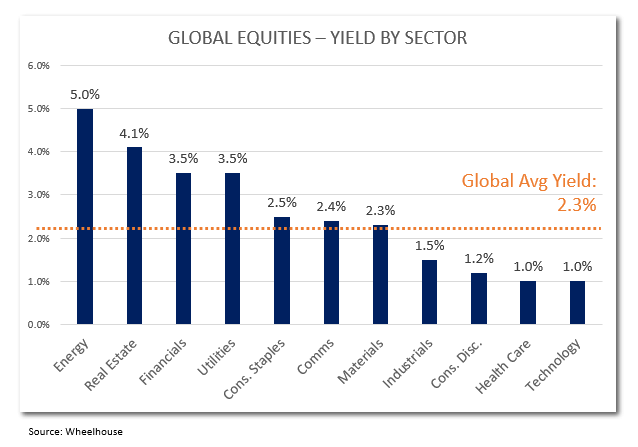
Implicitly this means that global equity income portfolios can often be materially underweight Technology and Health Care, and overweight Financials and Real Estate. These are often the exact same overweight exposures already present in an Australian equity income portfolio. As a result, rather than receiving the full benefit of diversification, an investor may be unintentionally ‘doubling-down’ on these sector concentrations.
Running a strategy that is heavily skewed to high yielding sectors can also give rise to missed opportunities. Take the Technology sector in the US as an example. This sector has been the dominant driver of growth in the US stock market over the past few years. However, because many tech companies pay no dividends, this principal source of return has been largely absent from many global income strategies.
Furthermore, the high-yield sectors of Energy, Real Estate, Utilities and Financials are also highly ‘factor’ dependent. A factor is a clearly identifiable return driver that can often account for most of the sectors return. For example, within the Energy sector, is it more important to simply get your oil price forecast correct, versus picking the best management team, or selecting the lowest cost producer? When sector returns are predominantly factor driven, a rising tide often floats all boats and can dwarf the impact of even the best stock pickers.
Portfolios with high factor concentrations such as commodity prices (for Energy), interest rates (for Real Estate and Financials), and inflation (for Utilities) are nearly always higher risk. By overweighting these sectors in particular, ‘going global’ for an income seeking investor may perversely deliver the exact opposite of what was intended, resulting in a higher risk portfolio with reduced diversification.
Global Buy-Write strategies as an alternative to traditional Global Equity Income Funds
Global equity Buy-Write portfolios can break the dividend dependency of more traditional GEI funds and thus be fully diversified across all sectors and geographical regions of the global economy
By way of example, the portfolio weights of the Wheelhouse Global Equity Income Fund relative to the ASX200 Index are represented below. Technology and Health Care are overweighted, and Financials, Materials, Real Estate, Utilities and Energy are all underweighted, providing an excellent source of diversification to an investor’s Australian equity portfolio.
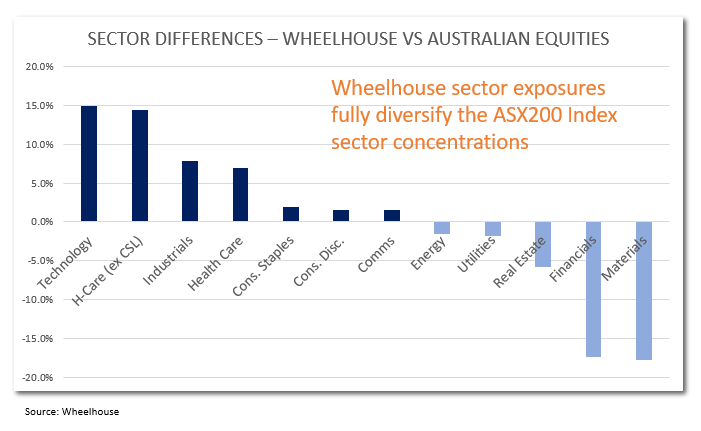
Consequently, integrating the returns of both the ASX200 and the Wheelhouse GEI Fund provides clear evidence of improved risk reduction in an investor’s portfolio.
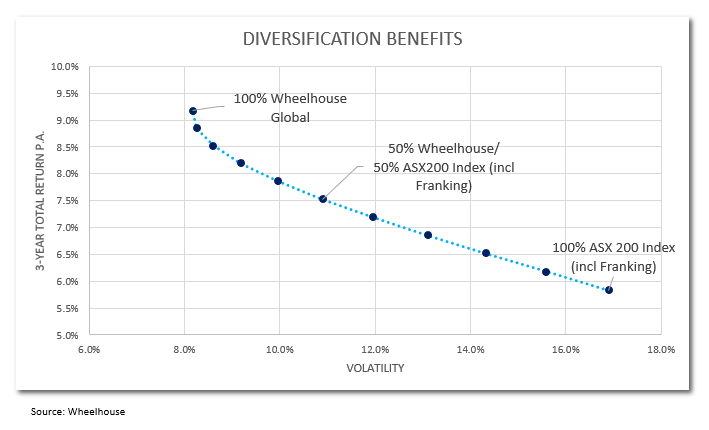
Income Generation
In a simple example of a Buy-Write strategy, an investor buys stock and sells a call option over that stock. The call option is an obligation to sell shares at a predetermined price in the future. As compensation for selling the call option, the investor receives income in the form of option premium. This strategy allows the inclusion of an attractive stock in an investor’s portfolio that may have otherwise been excluded if dividend yield was the sole consideration.
In essence, a Buy-Write strategy is designed to simply convert anticipated future capital gains into far more certain, and reliable, income streams. Typically, global equities deliver most of their return via capital growth and not income. At Wheelhouse, our approach seeks to reverse this relationship, with most of the return delivered via income and the remaining contribution from capital growth which is intended to grow the capital base over time.
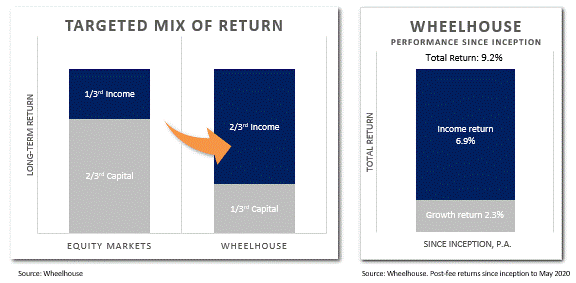
Capital Stability
In addition to improving diversification, Buy-Write strategies can meaningfully reduce risk. As the option premium is received upfront when the call option is sold, the share needs to fall by more than this amount before any loss is incurred. Thus for smaller moves, Buy-Write strategies can add an element of protection that is independent of the defensive characteristics of the shares themselves.
Safeguarding capital is a key priority for the Wheelhouse strategy, as we recognise that income generation depends upon a stable capital base that has the capacity to grow, and thus allows income streams to grow and keep up with inflation.
At Wheelhouse we take this defensive characteristic one step further via the integration of ‘always on’ tail protection to further protect capital degradation. Perhaps one for a follow up article, however the year to date performance chart below provides some evidence of the capital stability delivered through the Covid-19 pandemic.
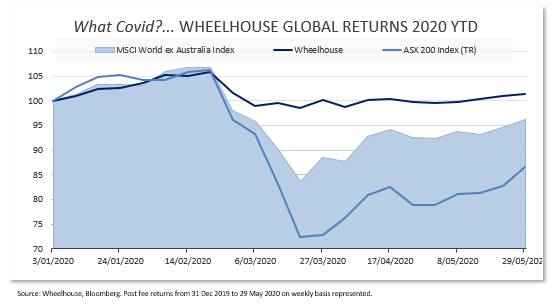
Outlook
Similar to the Australian market, dividend payments on global equities are being reduced too. The chart below plots expected dividend payments on the S&P500 Index for 2021, reflecting a 20% reduction in yields. In the years ahead this squeeze on yields may push global equity income strategies even further into the already concentrated high-yield sectors, making true diversification even more difficult to achieve.
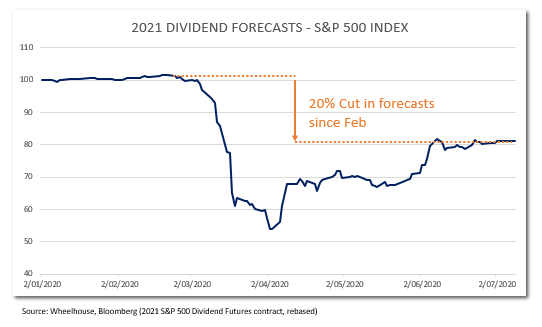
This can only increase risk further. In a recent Livewire article, we evaluated the relationship between higher yields and risk, and note the correlation. In the current environment, global Buy-Write strategies offer a well-established alternative that not only add genuine diversification to an Australian portfolio but also generate a reliable income that is unaffected by dividends and reduces risk in a portfolio.
Income, diversification and capital stability
Wheelhouse Investment Partners is a boutique asset manager with a mission to improve investment outcomes for Australian retirees. For more information please visit our website or send an enquiry using the 'contact' button below.

